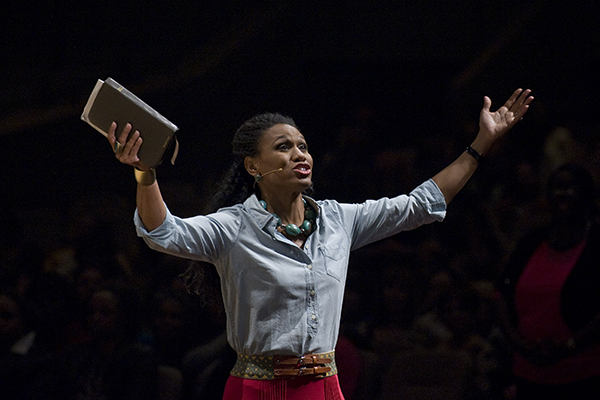
Here are four crucial biblical reasons why women should not be preaching. Before we look at these, it is imperative that the definition of preaching be established as the Bible portrays it and not as the culture has re-defined it.
When Jesus came on the scene after His incarnation, the purpose was to save His people from their sins (Matt 1:21). In the gospel narratives, we also see that preaching was paramount and actually spoken of as a reason for Christ’s coming and ministry (Mark 1:14; 38-39; 2:2). When Jesus saw the multitudes scattered without a shepherd, He taught them the Word of God (Mark 6:34). A foundational task of any Shepherding ministry is to preach and teach the Bible, God’s Holy Word. Also, we see Jesus commission his twelve disciples to do likewise in preaching (Mark 3:14; 6:7-12). Preaching or proclaiming or heralding the Word of God is the mark of the pastor-teacher. It is through the preaching of the gospel that Christ saves sinners (1 Cor. 1:21).
Jesus never commissioned women to preach. Women can have various responsibilities within Christian ministry but being a “Preacher,” is not one of them. There were no women apostles. The first reason that women should not preach is that there was no woman appointed to the Apostolic office [Note: Junia in Romans 16:7 is of note by the Apostles, not one of them].
Clearly, the apostolic office was marked out by the Son of God to be defined by preaching. This is significant as the foundation of the church is Jesus (1 Cor. 3:11). And, in the letter to the Ephesians, a highly ecclesiastical epistle, Paul says the Apostles and Prophets are that foundation (Eph. 2:20). The gifting of Pastor/Teacher (Eph. 4:11) is a call unto the ministry of the Word. To be a “Preacher,” biblically, is fill that office of pastor or elder or bishop or overseer. These words are synonymous and refer to the Pastoral Preaching role.
The second reason women should not preach is that the “preaching” office is reserved for men. One must not confuse this function with witnessing or sharing. To take a platform today as a “Preacher” at a church or conference with a mixed audience is in clear violation of having authority over men. (1 Tim. 2:12). In Greek, the notion of having authority is from a word meaning “authenticating oneself.” In this verse, that would mean, “authenticating oneself” over and against men. And, because this is in the context of God’s Word, it would be “authenticating oneself” over and against God Himself.

In His wisdom, God ordained that men and women have different functions in the home and Church. As the family is a microcosm of the Church and the man is the head of his family, so in the Church, men are to be pastor/teachers. Obviously, men and women are equal in their standing as sinners saved by grace (Gal.3:28), but the specific tasks and ministries have been specifically designated and assigned by God. To ignore these God-given mandates is to flirt with destruction.
Third, women have been described by the Bible as “the weaker vessel” (1 Peter 3:7). In the context of this letter, Peter admonishes women in this way: “Likewise, ye wives, be in subjection to your own husbands; that, if any obey not the word, they also may without the word be won by the conversation of the wives . . . (3:1, emphasis added). Clearly, women should aim to win their husbands “without the word.” Preaching is not for a woman within her own home, let alone before the entire audience of a congregation (church or conference).
Lastly, Paul, when listing the qualifications for Overseer/Pastor/Bishop in 1 Timothy 3:1-7, includes the following: “a one-woman man,” which is the specific gender of a male. Also, in this list, an elder has to be a good leader in his own home. It has already been noted that men are heads of their households (see Eph. 5:22-33; Col. 3:18-19). So, a leader in the home is the man. It is expected that anyone aspiring to be a Preacher, be a man.

One can simply brush off these biblical reasons by appealing to culture and assuming that we have come of age and that the Bible can be challenged on some matters. To do that is expected of liberals in both the mainstream Church and the academy. However, it is a shame when this attitude begins to become prevalent in the Evangelical church. Today, it is more likely to be an evangelical Baptist rather than a mainline Presbyterian that will ignore these biblical reasons that women cannot and therefore should not be “Preachers.”










